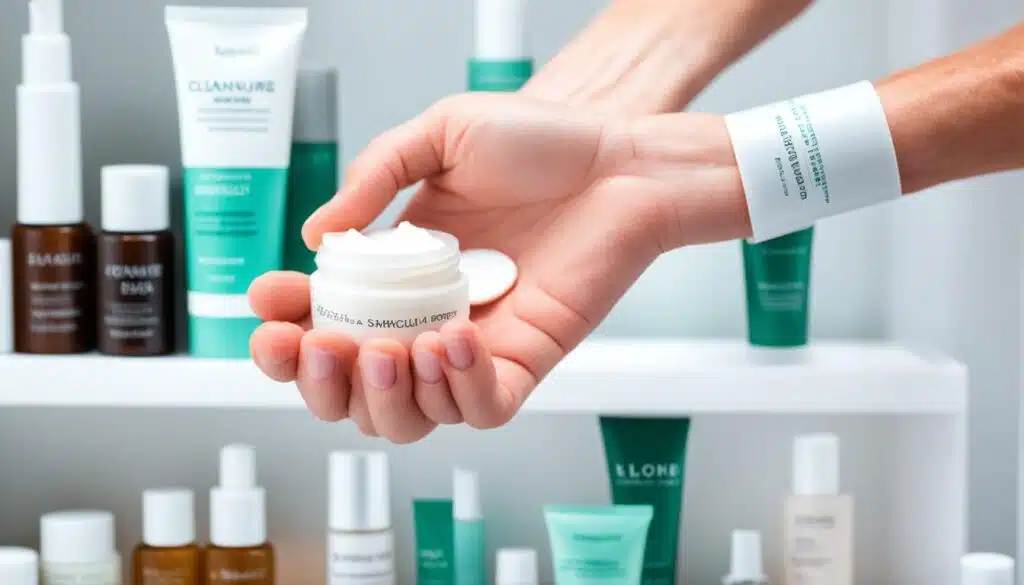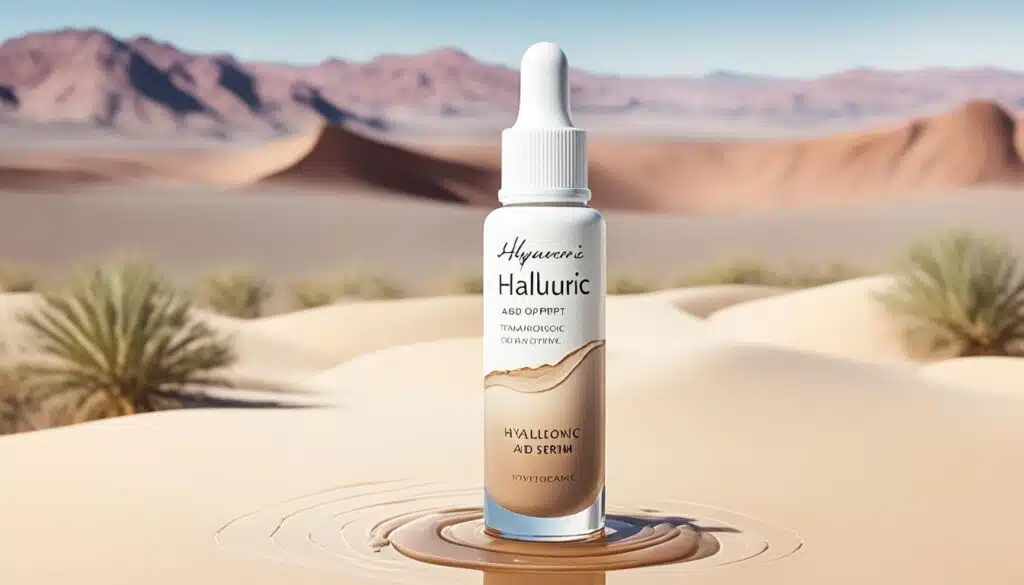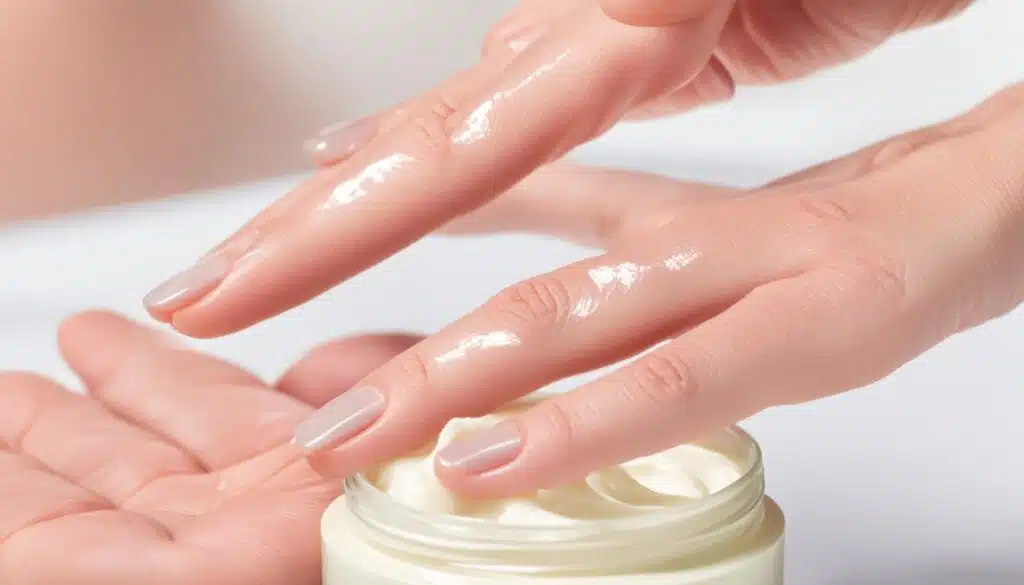Dry skin can be a constant struggle, leaving your complexion dull, rough, and uncomfortable. However, with the right skin care routine for dry skin, you can achieve a healthy and radiant complexion.
When it comes to caring for dry skin, it’s crucial to use skincare products with key ingredients that attract and retain moisture, support the skin’s natural moisture barrier, and improve skin texture. Incorporating hyaluronic acid, ceramides, niacinamide, and glycerin into your daily routine can help combat dryness and nourish your skin.
So, what does an optimal skincare routine for dry skin look like? It consists of three essential steps: cleansing, moisturizing, and sun protection.
Key Takeaways: Skin Care Routine For Dry Skin
- Choose skincare products with hyaluronic acid, ceramides, niacinamide, and glycerin to nourish dry skin.
- Avoid hot water and opt for gentle cleansers specifically formulated for dry skin.
- Use a moisturizer with hydrating and nourishing ingredients to lock in moisture.
- Protect your skin from the sun’s harmful UV rays with broad-spectrum SPF 30 or higher sunscreen.
- Follow additional tips like using a humidifier, avoiding alcohol-based products, and being gentle when exfoliating.
Key Ingredients for Dry Skin Care
Dry skin requires special attention to effectively hydrate and nourish the skin. When choosing skincare products, it’s important to look for key ingredients that provide the necessary moisture and support for dry skin. Let’s explore the top ingredients that can help combat dryness and improve the overall health of your skin.
Hyaluronic Acid
Hyaluronic acid is a powerhouse ingredient for dry skin. It is known for its ability to attract and retain moisture, helping to hydrate the skin and improve its elasticity. This ingredient replenishes the skin’s moisture levels, leaving it plump, smooth, and supple.
Ceramides
Ceramides play a vital role in maintaining the skin’s natural moisture barrier. They help to lock in moisture and prevent water loss, ensuring that the skin remains hydrated and protected. By restoring the skin’s barrier function, ceramides help to alleviate dryness and promote a healthier complexion.
Niacinamide
Niacinamide is a multi-tasking ingredient that offers numerous benefits for dry skin. It helps to calm and soothe the skin, reducing inflammation and irritation. Additionally, niacinamide promotes a more even-toned complexion, helping to minimize the appearance of redness and discoloration.
Glycerin
Glycerin is a humectant that draws moisture from the air and binds it to the skin, effectively hydrating and moisturizing dry skin. It also improves the skin’s texture, leaving it soft and smooth. Glycerin is a versatile ingredient that can be found in various skincare products, from cleansers to moisturizers.
Skincare products containing these key ingredients can provide the necessary hydration and nourishment for dry skin. Incorporating them into your daily skincare routine can help combat dryness, restore moisture, and improve the overall health of your skin.
For a more detailed comparison of these ingredients and their benefits, refer to the table below:
| Ingredient | Benefits |
|---|---|
| Hyaluronic Acid | Attracts and retains moisture, improves elasticity |
| Ceramides | Locks in moisture, supports the skin’s natural moisture barrier |
| Niacinamide | Calms the skin, promotes an even-toned complexion |
| Glycerin | Hydrates, moisturizes, and improves skin texture |
Causes and Factors of Dry Skin
Dry skin is a common condition that can be caused by a variety of factors. Understanding the causes and factors that contribute to dry skin is essential in effectively addressing and managing this issue.
One of the primary causes of dry skin is harsh weather conditions. Exposure to cold temperatures and low humidity can strip the skin of its natural moisture, resulting in dryness and discomfort.
Improper skincare techniques can also play a role in exacerbating dry skin. Over-cleansing or using harsh cleansers can disrupt the skin’s natural moisture barrier and lead to dryness. It’s important to choose gentle and hydrating skincare products specifically formulated for dry skin.
Certain dry skin conditions, such as eczema or psoriasis, can contribute to the development of dry skin. These conditions disrupt the skin’s barrier function and impair its ability to retain moisture, resulting in dry and flaky skin.
Internal factors, including age and reduced sebum production, can also contribute to dryness. As we age, our skin produces less natural oil, which helps keep the skin hydrated. This can lead to increased dryness and the need for a more hydrating skincare routine.
Living in a cold climate with low humidity can further aggravate dry skin. The lack of moisture in the air can cause the skin to lose moisture more rapidly, resulting in dryness and discomfort.
Having a weakened skin barrier can also increase the likelihood of experiencing dryness. The skin’s natural barrier function helps retain moisture and protect against external irritants. When this barrier is compromised, the skin becomes more susceptible to dryness.
Overall, understanding the causes and factors that contribute to dry skin is crucial in developing an effective skincare routine and managing dryness. By addressing these underlying factors and nourishing the skin with hydrating products, it is possible to restore moisture and achieve a healthier complexion.
Dermatologist Recommendations for Dry Skin Care
Dermatologists provide valuable insights and recommendations for an effective skincare routine catering to dry skin. By following their expert advice, you can help alleviate dryness, restore moisture, and achieve a healthier complexion. Here are some essential skincare tips and product recommendations straight from the experts:
Cleansers
When choosing a cleanser for dry skin, dermatologists recommend opting for gentle and fragrance-free options that won’t strip the skin’s natural oils. Look for cleansers specifically formulated for dry skin, as they are designed to hydrate and nourish while effectively removing impurities. Some recommended cleanser ingredients for dry skin include hyaluronic acid and ceramides, known for their ability to attract and retain moisture.
Shower Habits
Long and hot showers can further dehydrate dry skin. Dermatologists advise keeping showers short and using lukewarm water instead. Limiting shower time and avoiding hot water can help prevent excessive moisture loss and preserve the skin’s natural oils.
Moisturizers
Using a moisturizer is crucial for dry skin care. Dermatologists recommend choosing moisturizers that contain beneficial ingredients like ceramides, urea, or dimethicone. These ingredients help lock in moisture, soothe dryness, and improve the skin’s overall texture. Opt for cream-based moisturizers rather than lotions, as they provide more intensive hydration for dry skin.
Protective Clothing
Harsh weather conditions can exacerbate dry skin symptoms. Wearing protective clothing, such as scarves, hats, and gloves, can shield your skin from cold winds and harsh climates. By protecting your skin from external elements, you can help prevent further dryness and maintain optimal hydration.
Sun Protection
Dermatologists strongly emphasize the importance of daily sun protection for dry skin. Unprotected exposure to UV rays can contribute to skin damage and dryness. To safeguard your skin, apply a broad-spectrum SPF 30 or higher sunscreen, even on cloudy days. Sunscreen not only shields your skin from harmful rays but also prevents moisture loss, ensuring your dry skin remains properly hydrated.
Following these dermatologist recommendations and incorporating them into your daily skincare routine can make a significant difference in managing dry skin. By using gentle cleansers, adjusting shower habits, using moisturizers with beneficial ingredients, wearing protective clothing, and practicing sun protection, you can effectively combat dryness and achieve healthier, more hydrated skin.
Step 1: Cleansing for Dry Skin
Cleansing is an essential step in a skincare routine for dry skin. To effectively cleanse without stripping away essential moisture, it’s important to choose a gentle cleanser specifically formulated for dry skin.
Look for a non-foaming cleanser that is mild and fragrance-free. Cleansers with hydrating ingredients like hyaluronic acid and ceramides are beneficial for dry skin, as they help attract and retain moisture, and support the skin’s natural moisture barrier.
“A gentle cleanser with hydrating ingredients can effectively cleanse dry skin without causing further dryness or irritation.” – Dr. Emily Sanchez
In addition to traditional cleansers, oil cleansers are also suitable for dry skin. Oil-based cleansers effectively remove dirt, excess oil, and impurities without disrupting the skin barrier. This cleansing method can help maintain the skin’s natural moisture balance and leave it feeling nourished and refreshed.
Step 2: Hydrating and Nourishing Serums for Dry Skin
After cleansing, it’s essential to replenish and hydrate dry skin with serums. One popular and effective option for dry skin is hyaluronic acid serum. Hyaluronic acid is a powerhouse ingredient that attracts and retains moisture, helping to alleviate dryness and improve skin hydration.
When selecting a serum for dry skin, look for nourishing ingredients like ceramides and vitamin B5. Ceramides help support the skin’s natural moisture barrier, preventing moisture loss and promoting a smoother and softer complexion. Vitamin B5, also known as panthenol, aids in hydration and can assist in reducing the appearance of fine lines and wrinkles.
Benefits of Hydrating Serums for Dry Skin
- Intense Moisture: Hydrating serums provide an extra surge of moisture, helping to relieve dry and dehydrated skin.
- Improved Skin Texture: By nourishing the skin with hydrating ingredients, serums can help improve skin texture, leaving it smoother and softer to the touch.
- Reduced Fine Lines and Wrinkles: The hydrating and plumping effect of serums can help minimize the appearance of fine lines and wrinkles, promoting a more youthful-looking complexion.
No matter which serum you choose, it’s important to apply it after cleansing and before moisturizing. This allows the serum to penetrate deeply into the skin and maximize its benefits. Remember to follow the product instructions for the recommended application and frequency.
“Hydrating serums containing ingredients like hyaluronic acid and ceramides can significantly benefit individuals with dry skin. These serums provide an intense boost of hydration and nourishment, helping to improve skin moisture levels and overall texture.” – Dr. Emily Miller, Dermatologist
Consider incorporating a hydrating and nourishing serum into your daily skincare routine for dry skin. Not only will it help restore moisture to your skin, but it can also enhance the effectiveness of your moisturizer and other skincare products.
Step 3: Moisturizing and Protecting Dry Skin
Moisturizing is a vital step in a skincare routine for dry skin. To combat dryness and maintain hydration, it’s essential to choose a moisturizer specifically formulated for dry skin. Look for a nourishing and hydrating moisturizer, preferably a heavier cream rather than a lotion, as it provides intense moisture and helps lock it in for long-lasting hydration. A moisturizer packed with hydrating ingredients such as hyaluronic acid, ceramides, and glycerin can effectively replenish the skin’s moisture barrier, leaving it soft, supple, and smooth.
Additionally, protecting dry skin from the sun’s harmful UV rays is crucial. Exposure to the sun can aggravate dryness and lead to further skin damage. Therefore, it’s essential to incorporate sun protection into your daily skincare routine. Choose a broad-spectrum sunscreen with a minimum SPF of 30 or higher specifically designed for dry skin. Applying sunscreen helps prevent skin damage and keeps dry skin hydrated and protected.
Remember to apply moisturizer to cleansed skin and follow it up with sunscreen as the last step in your skincare routine. This ensures that your skin stays moisturized, nourished, and shielded from both dryness and the damaging effects of the sun.
By incorporating both a moisturizer and sunscreen tailored to dry skin into your routine, you can effectively combat dryness, maintain optimum hydration levels, and protect your skin from the damaging effects of the sun’s rays.
Additional Tips for Dry Skin Care
Aside from following a proper skincare routine, there are several tips that can help you optimize your dry skin care routine and achieve healthier, more hydrated skin. Incorporating these tips into your daily skincare regimen can make a noticeable difference in the appearance and feel of your dry skin.
1. Avoid Hot Water
Hot water can strip the natural oils from your skin, exacerbating dryness. Instead, opt for lukewarm water when cleansing your face and body. This helps to retain the skin’s natural moisture and prevent further dryness.
2. Moisturize on Slightly Damp Skin
For optimal moisturization, apply your moisturizer or facial oil on slightly damp skin. After cleansing or showering, gently pat your skin dry with a towel, leaving it slightly damp. This helps to lock in moisture and improve absorption of the moisturizer into the skin.
3. Use a Humidifier
Adding moisture to the air can greatly benefit dry skin. Consider using a humidifier in your home, especially during the winter months or in dry climates. This helps to increase the humidity levels and prevent excessive moisture loss from the skin.
4. Hydrate from Within
Drinking enough water is crucial for maintaining hydrated skin. Proper hydration from within can help improve the appearance and texture of dry skin. Aim to drink at least 8 glasses of water a day and incorporate hydrating foods into your diet, such as watermelon, cucumbers, and citrus fruits.
5. Avoid Alcohol-Based Products
Products containing alcohol can further dry out the skin. When selecting skincare products, make sure to avoid those that contain alcohol or have it listed as one of the main ingredients. Look for alcohol-free alternatives that are specifically formulated for dry skin.
6. Be Gentle When Exfoliating
Exfoliating can help remove dead skin cells and improve the overall texture of the skin. However, for dry skin, it’s important to be gentle and avoid harsh exfoliants that can cause further dryness and irritation. Opt for gentle exfoliating products or use a soft washcloth or konjac sponge to exfoliate your skin.
7. Protect Your Skin
Protecting your skin from environmental aggressors is crucial for maintaining its health and preventing further dryness. Always wear sunscreen with a broad-spectrum SPF of 30 or higher to protect your skin from harmful UV rays. Additionally, cover up with protective clothing, a wide-brimmed hat, and sunglasses when exposed to excessive sun or harsh weather conditions.
By incorporating these additional tips into your dry skin care routine, you can effectively manage and improve the hydration levels of your skin. Remember that consistency and patience are key, as it may take time for noticeable results to appear. With proper care and attention, you can achieve healthy, radiant skin that feels nourished and hydrated.
Also Read: How Do I Keep My Skin Healthy All Year? Tips For Changing Moisturizers With The Seasons
Conclusion
Taking care of dry skin requires a consistent and hydrating skincare routine. Cleansing, moisturizing, and protecting the skin from the sun’s harmful rays are essential steps in maintaining healthy and hydrated skin. By following these guidelines and understanding the causes and factors of dry skin, you can achieve a healthy and radiant complexion.
Key ingredients like hyaluronic acid, ceramides, and niacinamide are crucial for providing the necessary hydration and support for dry skin. Incorporating dermatologist-recommended products that contain these ingredients into your skincare routine can further enhance its effectiveness.
In addition, following the additional tips for dry skin care, such as avoiding hot water, applying moisturizer on slightly damp skin, using a humidifier, and staying hydrated from within, can help optimize your dry skin care routine.
By implementing these practices, you can effectively address and manage dry skin, resulting in a healthier and more vibrant complexion. Remember, a well-maintained and nourished skin barrier is the key to keeping dry skin at bay and achieving lasting hydration.
FAQs
Q: What are the best products for dry skin?
A: The best products for dry skin include gentle cleansers, hydrating moisturizers, face oils, and serums with ingredients like hyaluronic acid and ceramides.
Q: How important is sunscreen in a dry skin regimen?
A: Sunscreen is crucial for dry skin as it helps protect the skin from harmful UV rays that can further dry out the skin and lead to premature aging.
Q: What should be included in a nighttime skincare routine for dry skin?
A: A nighttime skincare routine for dry skin should involve cleansing the skin, applying a hydrating night cream or serum, and using a gentle eye cream.
Q: How should I start my morning skincare routine for dry skin?
A: Start your morning skincare routine for dry skin by cleansing your face with a gentle cleanser, applying a hydrating moisturizer, and using a sunscreen with at least SPF 30.
Q: Is face oil beneficial for dry skin?
A: Yes, face oils can be beneficial for dry skin as they help to lock in moisture and nourish the skin with essential fatty acids and antioxidants.
Q: How important is following a consistent dry skin routine?
A: It is crucial to follow a consistent dry skin routine to maintain skin hydration, prevent moisture loss, and improve overall skin health.
Q: When should I apply moisturizer for dry skin?
A: For best results, apply moisturizer on damp skin, right after cleansing or taking a shower, to lock in moisture and keep your skin hydrated throughout the day.











